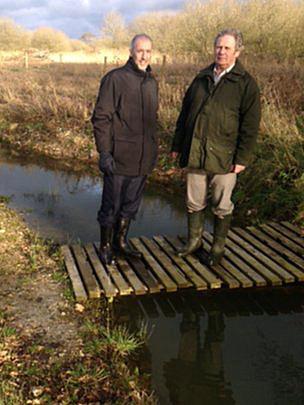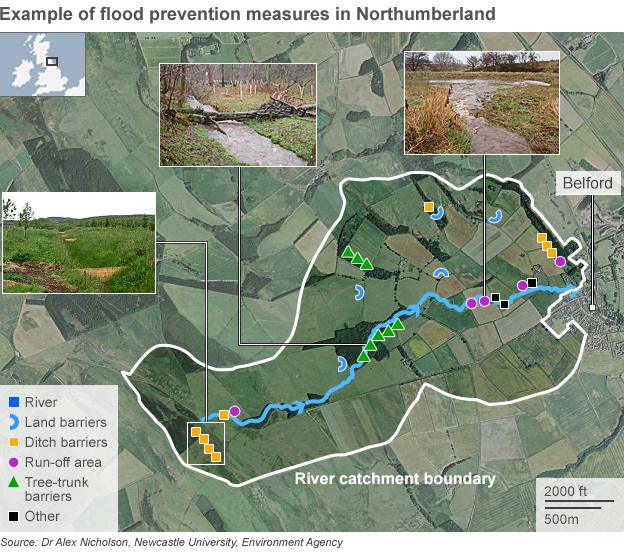Farmers urged by WWF to do more to prevent flooding
- Published

Environmentalist David Nussbaum (left) and farmer John Austen support "lazy river" schemes
Farmers getting public grants should be forced to capture water on their land to prevent floods downstream, environmentalists have said.
Green group WWF said farmers should get subsidies only if they agreed to create small floods on their own land to avoid wider flooding in towns and villages.
The average family pays £400 a year in grants to farmers.
Farmers' leaders rejected the idea but said they would support incentives to farmers to prevent flooding.
WWF is already working with eight farmers on the young River Nar in Norfolk in an experimental project to restore upstream rivers to their original state.
Rivers have been squeezed into straight, fast-flowing channels over hundreds of years to hurry rainwater off fields.
But that has contributed to flooding of prime agricultural land downstream. Fast-flowing rivers also carry silt which causes rivers to clog up.
Meandering pattern
Using old maps, the experimental Norfolk scheme redirects rivers into their original meandering pattern.
Trees have been felled into the stream and when rain falls heavily the river floods and water soaks into the soil.
WWF said the speed of water flowing through the River Nar had fallen noticeably.
"Lazy rivers" do not have the energy to carry much silt, either, and this should reduce the need for dredging downstream.
Special ponds have also been created to catch much of the fertile silt running off fields and keep it for local farmers to spread on their land.
This is the sort of scheme the Environment Agency has in mind when it says dredging the rivers in the Somerset Levels may not be the best solution.

WWF is supporting catchment management schemes in several countries including Colombia, Tanzania and China.
The group's UK chief executive, David Nussbaum, told BBC News: "We pay farmers a lot of money in grants through the Common Agricultural Policy [nearly £50bn a year]. What do we get in return?
"There should be an obligation on farmers who benefit from payments to farm in a way that's sensitive to river catchments and which contributes to managing water in a way that reduces flooding and silting downstream."
He said "rewilding" rivers this way would be much cheaper than installing high concrete walls downstream.
"You can achieve your aims on flooding by spending money better - not just spending more."
WWF claimed that the 800 acres under the Norfolk scheme held back 157 million litres of water in 2013.
'Icing on the cake'
John Austen, a Norfolk farmer and chairman of a drainage board, said he supported the lazy river scheme.
"Here we have a flood plain protecting the village of Litcham. It's full of wildlife… absolutely fantastic. Drainage is not about diggers and silt - what we have to think about is the whole river starting with the catchment right the way down to the sea."
But Mr Austen opposed the idea that grants should be made conditional on capturing water.
"It shouldn't be compulsory but to really incentivise the farmer to do these projects he will want a little bit of icing on the cake - I suggest £200 a hectare to allow your grass to be flooded."
In theory farmers can already get extra EU grants to hold water on their land, and some of the participants in the Nar trial are receiving extra subsidies for wildlife - but experts say subsidies for water storage are much harder to obtain than grants for benefiting wildlife.
A study for the Environment Agency, external suggested that works such as these needed to be carried out across substantial portions of a river catchment to be really effective and WWF says that implies that greater pressure needs to be imposed on farmers to take part.
Environment Secretary Owen Paterson planned to reshuffle farm grants so more money could be made available for such schemes but was overruled by the prime minister after the National Farmers' Union (NFU) said it might put rural votes at risk.
'Balanced approach'
An NFU spokesman said: "Although we agree that 'slowing the flow' should have an important role to play in reducing flood risk from hilly upland catchments, techniques such as tree planting need to be located carefully.
"They are not a panacea, and should not be expected to significantly reduce flooding everywhere and on their own.
"For this reason we would not support a requirement for all farmers to have to capture water on their land in order to access grants from the EU.
"Our approach to river flooding must be balanced, looking at river systems as a whole; attenuating flows upstream where needed and maintaining capacity downstream, including de-silting and vegetation management.
"The NFU would welcome guidance and environmental stewardship options that facilitated farmers to use natural processes to help control flows in, over and around farms and where appropriate store water."
The back-to-nature river scheme in Norfolk has been subsidised by Coca-Cola which has a global partnership with WWF on fresh water issues.
The company's local plant relies on sugar beet grown near the River Ouse which runs above field level and is prone to flooding. The Ouse is fed by the River Nar.
The Nar scheme has a cultural element too - Charles Rangeley Wilson, an author and conservationist, is researching old maps to find the original course of rivers so the meanders can be restored.
"You have to work with topography, not against it," he said.
Follow Roger on Twitter@rharrabin, external.
- Published28 January 2014
- Published28 January 2014
- Published27 January 2014
- Published14 December 2013